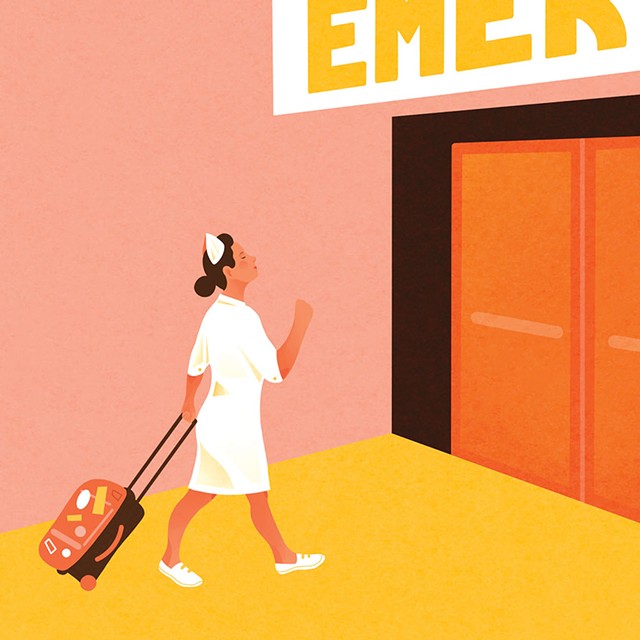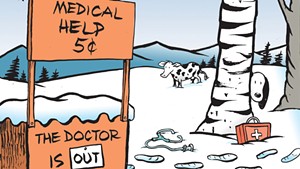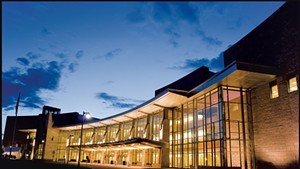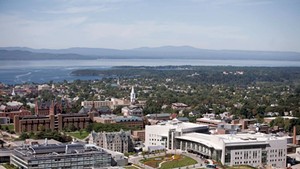
- Diana Bolton
Travel nurses, who move from state to state and work on short-term contracts, are meant to be used as Band-Aids — temporarily filling jobs long enough for hospitals to recruit permanent staff.
But as the pandemic drives health care workers from the profession, some Vermont hospitals have come to rely on travelers as a form of life support, a trend that could have long-term consequences for the state's health care system.
At the University of Vermont Medical Center, the state's largest hospital, travel nurses filled 366 full-time positions as of last Friday, representing 16 percent of the nursing workforce and five times more than the pre-pandemic average.
Most of these temporary workers are getting paid far more than their permanent counterparts, compounding a long-standing morale problem and costing the hospital millions. Some nurses have even left to join the travel circuit themselves, and the hospital has backfilled their positions with yet more travelers.
UVM Health Network leaders acknowledge that the situation is unsustainable and say weaning off this expensive workforce is one of their top priorities. But exactly how they plan to do that — and whether their efforts will prove successful — remains unclear.
"We don't know where the market is going to land," said Mary Broadworth, vice president of human resources at the UVM Health Network. "The art and science of what is going to be retentive, and what needs to be built in the long term, is a struggle most organizations are dealing with right now.
"We have not [made] our final decision on how to approach that, but we are studying it all the time," she added.
UVM Medical Center is indeed not alone in this conundrum. Staffing shortages have plagued hospitals across the country as the pandemic rages on and frontline workers burn out. Thousands of nurses have left the profession, while others have sought less stressful nursing jobs at doctor's offices or schools.
Hospitals have responded to this exodus by seeking new graduates. But colleges were struggling to produce enough nurses long before the pandemic — largely because of a lack of faculty — and demand has far outpaced supply.
In Vermont, colleges that offer nursing programs — the University of Vermont, Castleton University, Vermont Technical College and Norwich University — have more than doubled their number of annual graduates over the last two decades and now educate about 350 nurses each year.
But a third of those grads don't end up staying in state, and those who do increasingly seek jobs in nonhospital settings.
"Nurses, along with everyone else during the pandemic, have started to rethink their careers, their livelihood, and [some have] thought, Maybe a hospital isn't the best match for me," said Mary Val Palumbo, a professor of nursing and director of interprofessional education at UVM's College of Nursing and Health Sciences.
Unable to recruit new nurses fast enough, many U.S. hospitals have relied on travelers to stay afloat. A recent survey from staffing agency Avant Healthcare Professionals found that 90 percent of hospitals have bolstered their staff with travelers during the pandemic, up from fewer than 60 percent in 2019.
The agencies that employ travel nurses have managed to fill only a fraction of requests coming their way. In August, one of the nation's biggest agencies, Aya Healthcare, said it had more than 40,000 unfilled jobs on its website.
UVM Medical Center spent about $20 million a year on travelers before the pandemic, then doubled that total in the fiscal year that ended in September. During its budget approval process before the Green Mountain Care Board this summer, UVM Medical Center said it aimed to hire enough permanent staff to cut its travel workforce in half. But a spokesperson told Seven Days last week that the hospital still expects its travel nurse costs to be "much higher" than last fiscal year's $40 million.
"Other hospitals have closed beds," spokesperson Annie Mackin said in an email, noting that UVM is filling about 425 beds a day, up from a pre-pandemic average of 375. "We do not want to do that, especially as we care for more patients than ever in the hospital."
The large bill is partly the result of having more travelers. But it's also because the costs associated with them have risen sharply.
"Travel nurses are running on what you would call kind of the spot market," said Joanne Spetz, a professor at the University of California San Francisco who focuses on health care workforce issues. "The price for them is whatever the market will bear."
Capitalizing on the rising demand for their clients, travel nurse agencies have sought more money from hospitals, spawning a national bidding war that the UVM Medical Center now finds itself trapped in.
The medical center, which had to pay travel agencies $75 to $85 an hour before the pandemic, is now forking over hourly rates between $140 and $185. Travel agencies take a cut before passing the money on to their clients, but the nurses still end up taking home much higher pay than permanent staff for the same work. Many travelers sign contracts for between eight and 16 weeks.
One agency recently posted a three-month job, offering $4,800 for nurses willing to work 48 hours a week at UVM Medical Center's labor and delivery unit — a $100 hourly rate. That was on top of a $1,200 monthly room and meals stipend. The weekly cost to the hospital would be even higher.
By contrast, entry-level staff nurses at the hospital start out at $30 an hour.
While hospital staff say they appreciate the help, they still resent the pay disparities, particularly given the union's yearslong fight to increase wages. Nurses staged a brief strike three years ago amid a bitter dispute over pay and staffing levels. The parties eventually reached an agreement to raise salaries by an average of 16 percent over three years, but nurses say those wages still aren't competitive.
"At one point [this year], we were working shoulder to shoulder with people who were making four times as much money as us," said Maggie Belensz, 28, a staff nurse in the emergency department.
"It's just very demoralizing," said another nurse, who requested anonymity for fear of retribution from the hospital. "You're sitting here, training these people — which, with constant turnover, almost just adds another job to your job — all the while knowing that they're making three or four times what you are."
At least five people who work on the nurse's floor have quit to pursue travel work in recent months.
Even some travel nurses empathize with the staff's situation. One, who requested anonymity out of fear that the hospital would cancel her contract for talking to the media, spent five years working as a permanent nurse in the South before joining the travel circuit in January.
Her main goal was to see more of the country: "places I would never have been able to afford — or have the time — to go and explore." Then the money started rolling in. She's paid off a large chunk of her student loans and credit card debt and has been able to start an emergency fund. "I can breathe a little easier now," she said.
But she also knows that many of her UVM Medical Center colleagues aren't in the same position. "I feel terrible for the staff," she said. "They know how much money UVM is throwing at [us]. You can feel the tension in the room sometimes, and I completely understand — I'd be just as frustrated."
Another traveler, 27-year-old Gretchen Cyros, began her nursing career at UVM Medical Center in 2017, then left for a job in Philadelphia. She returned to Burlington this fall for her first-ever travel gig. She's enjoyed working alongside her former colleagues, she said, but knowing how much more she's making compared to them weighs on her. "It's a moral dilemma that I feel every day," Cyros said.
Costs aren't the only concern with large travel workforces. Care can also suffer, because travelers typically don't receive the same level of training about hospital-specific workflows and procedures — or even where certain supplies are located.
"It's not someone you work side by side with every day," said Deb Snell, who works in the ICU and serves as president of the UVM Medical Center's nurse union. "You don't know what their skills are. You don't know what their strengths and weaknesses are. It just takes longer for everything."
Turnover has been so high of late that staffers fresh off orientation have been called on to train travelers, according to the nurse who requested anonymity. In some cases, travelers have trained other travelers.
"If you're brand-new, you don't really know what you don't know," the nurse said.
It's too soon to tell whether the travel nurse boom will dramatically alter the health care workforce landscape long-term. Many nurses will stay in the roles while the money's good, but experts expect the market to cool as COVID-19 ebbs. If contracts become less lucrative, some may decide that the traveler lifestyle isn't worth it.
At the same time, the last of the baby boomers are now reaching retirement age, posing the risk of another mass exodus from the profession. Employers must be laser-focused on recruitment and retention moving forward if they hope to keep pace, said Spetz, the California professor: "It becomes a long game."
At the UVM Medical Center, plans for stabilizing the workforce are still being formulated.
The health network says it's conducting a market analysis to see whether its pay structure is competitive. It's mulling over whether it needs to start offering bonuses and is looking for ways to give staff nurses more flexible schedules. The network has hired 12 more recruiters, with plans to expand its out-of-state searches.
The goal, officials say, is to reduce the number of travelers back to at least pre-pandemic levels.
"We really do want to get back to our own staff being a much higher percentage [of the workforce]," said Peg Gagne, UVM's chief of nursing.
Permanent staff are skeptical. They say the hospital has shown little interest in keeping them around.
The hospital and union recently decided to postpone negotiations on a full new contract until next year because of COVID-19. But they agreed to open talks for only wages, and the nurses brought an offer to the table in July.
"It was flat-out denied," said Rachel Foxx, a maternity nurse who has worked at UVM Medical Center for 15 years. "It was not a negotiation. They didn't bring us a number at all."
Shortly afterward, hospital management sent baskets of snacks to each floor with a generic card thanking employees for their work. The baskets contained potato chips, gummies and granola bars — but only enough for about one shift, Foxx said. By the time the night workers arrived, most of the baskets were empty.















Comments
Comments are closed.
From 2014-2020, Seven Days allowed readers to comment on all stories posted on our website. While we've appreciated the suggestions and insights, right now Seven Days is prioritizing our core mission — producing high-quality, responsible local journalism — over moderating online debates between readers.
To criticize, correct or praise our reporting, please send us a letter to the editor or send us a tip. We’ll check it out and report the results.
Online comments may return when we have better tech tools for managing them. Thanks for reading.